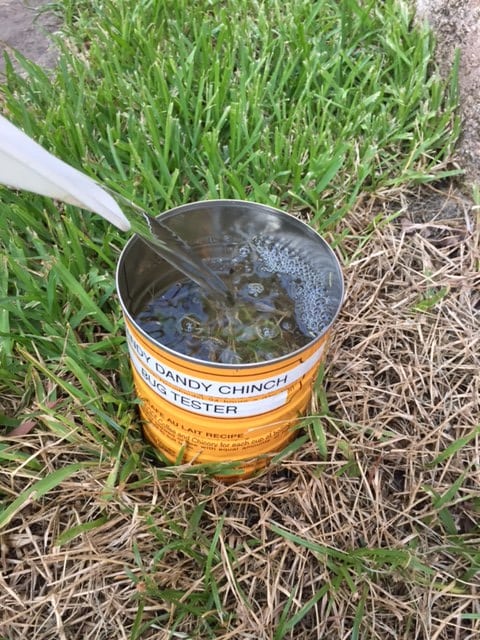As I’ve said in many a Quick Tip, your lawn needs three things to thrive: sun, water and food (fertilizer.) If you are doing everything right, but your lawn still looks wrong, you may have chinch bugs.
Chinch bugs are bad news. Over the years I’ve seen them cause more lawn damage than any other insect. What makes them particularly bad is when the first signs of chinch bug damage appear (typically small yellowing spots in your lawn,) most people wrongly assume they have drought damage, fungal disease or an iron deficiency. They then try and solve those problems which wastes money and completely ignores the real problem, chinch bugs.
In North Texas chinch bugs attack St. Augustine lawns. They thrive in hot, dry soil and frequently start eating the St. Augustine near concrete.
How can you tell if you have chinch bugs versus the other problems I noted above? To be honest it can be tough for a non-professional. Usually there is an area between the brown grass and green grass that is yellow. If you part the grass leaves and stare at the ground, you might eventually see them. Fair warning, you are going to see an amazing variety of bugs running around and it takes some patience to identify the chinch bugs (assuming they are there.)
The best clue is if the area is spreading over a period of a few days – most sprinkler issues don’t spread. Watch for that and also notice if the soil in that area is the same dampness as the surrounding green grass area. In the end, if you suspect you have chinch bugs, you’re usually better off treating the area for them just to be sure.
Unlike grub worms, there isn’t a preventative for chinch bugs. The way to control them is to treat while they are actively feeding. At Village Green we apply Bifenthrin which has proven to be very effective in killing them.
Even though there is no preventative for chinch bugs, the Village Green surface insect program can significantly reduce the risk of wide scale chinch bug damage. Our surface insect program uses Bifenthrin, which controls fleas, ticks, and ants in addition to reducing your chance of large areas chinch bug damage.
We apply it every month or so during the peak insect season and it usually kills off any active chinch bugs too. The surface insect program is an added cost to ourfertilization and weed control plan. If you’d like more information on it or questions regarding your lawn call at us at 972-495-6990 or [email protected]. We’d be happy to answer your questions if you want to do it yourself. Or if you want to save time and have us do it, we’d be happy to give you an affordable estimate on what it would cost for your lawn.
If you have any lawn or landscape questions give us a call at 972.495.6990 or email [email protected].


